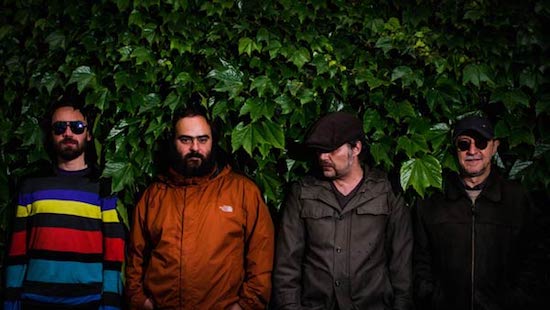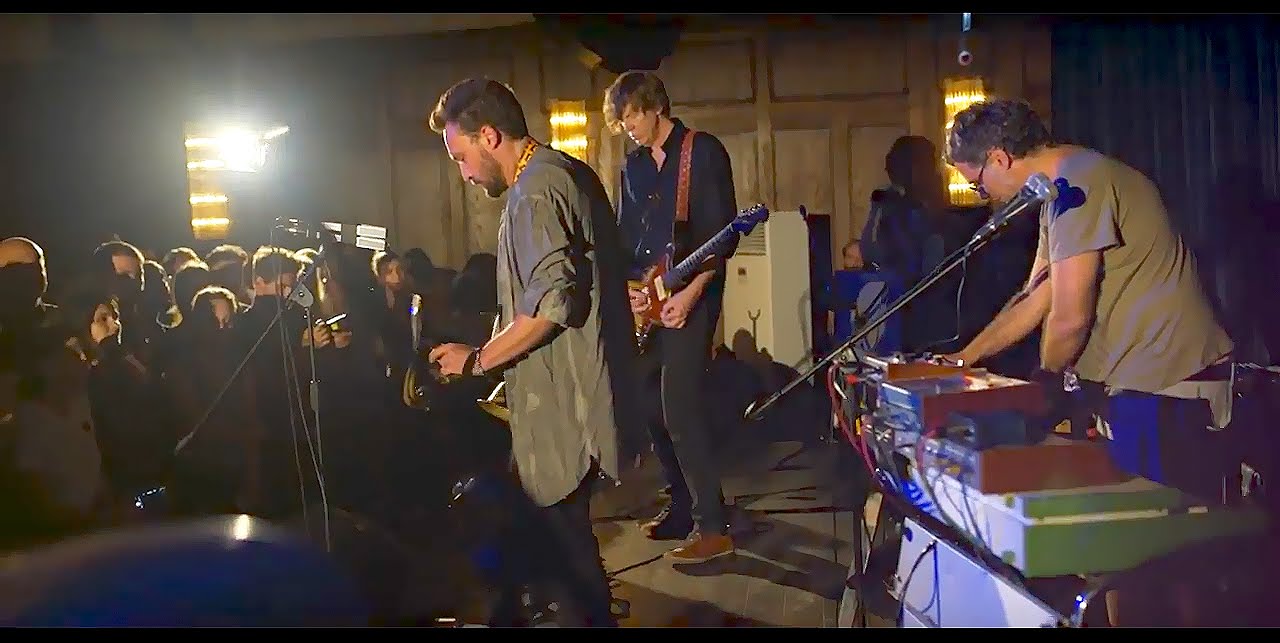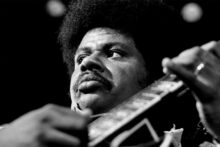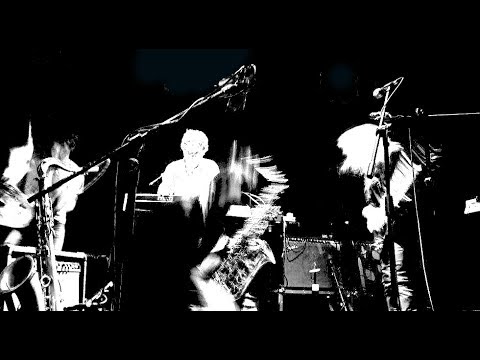In a field frequently dulled by over-intellectualisation, Turkish voyagers Konstrukt make delightfully impure free music. Born out of an informal jam session in 2008, the group mutated into a revolving collective of musicians from the Istanbul experimental scene. Currently centring around guitarist Umut Çağlar and saxophonist Korhan Futacı, they’ve now been cutting terrifying swathes across European jazz festivals and Turkish art spaces alike for the past six years.
Collaboration is the driving force of the group, both in terms of its core membership (which currently includes percussionists Erdem Göymen and Berkan Tilavel) and the raft of collaborators they’ve worked with. Theirs is a truly cannibalistic approach to improvisation, subsuming all manner of diverse luminaries into the throbbing organism that is Konstrukt – avant jazz greats like Joe Mcphee, Peter Brötzmann and Evan Parker for sure, but also more unexpected travellers – 808 State’s Graham Massey, Thurston Moore and, most recently, the out rock savant Keiji Haino. In fact, it was Haino – that usually singular musician – who encapsulated the group’s ethic before an Istanbul performance with the words, “Tonight we are five on stage, not four plus one.” “Simple mathematics, in fact,” concurs Çağlar, whom tQ recently caught up with via Skype and email.
In regard to his favoured approach to music-making, Çağlar quotes his favourite Bruce Lee axiom – “Be like water so you cannot break.” This, at the same time as musing on the prospect of collaborating with the likes of Aphex Twin and Squarepusher. Such fluidity is a pattern Çağlar has maintained all his musical life. From an early fascination with Ornette Coleman he transgressed into the murky world of techno. “It was probably the beginning of the 90s, when I was going to university,” he says. “There was this big boom going on in Istanbul, with very big clubs opening. Me and a friend of mine used to build our own gadgets, like electronic instruments we made from scratch. And at that time I started to DJ. I spent 10 years playing the big clubs in Istanbul.” This non-linear trajectory into performance certainly continues to inform the music of Konstukt today. Speaking of his eventual disillusion with the word of club music, Çağlar contends, “I was too tired. But I started to play guitar again at around 2007 and 2008 – I started Konstrukt at around that time – and I felt that I should experiment and combine my knowledge of techno music to my playing. Inject this electronic knowledge to Konstrukt’s music.”
But while spaced-out, dub-drenched electronics are central to Konstrukt’s sound, so too is their engagement with the traditional music of their homeland. More recently, they introduced traditional woodwind instruments such as the zurna into their already-heady cosmic slop, a move influenced by their collaboration with legendary Turkish percussionist Okay Temiz in 2013. Yet perhaps even more important than the new textural potentials these instruments offer is their connection to the improvisatory tradition of Turkish folk music, in which spontaneity and continuity are not mutually exclusive concepts. As Çağlar points out, “We never felt that our music is a product from a modern laboratory. We try to keep the spontaneity and the improvisational heritage of old folklore which has an history of thousands years in these lands.”
So after having had those techno years, what made you want to start a free jazz group?
Umut Çağlar: Actually it was already there. I never stopped listening to avant garde jazz when I was DJing. Sometimes I was going too far when I was DJing, and people would complain that I was playing so weird sometimes.
Did you all have a background in free jazz/improv?
UC: Personally I find the band’s musical influences and background very eclectic as all the members and collaborators have different tastes and side projects. Personally, I cannot deny my past as a techno DJ and also some early experimental no wave experiments in the early 90s. Also recently, we made peace with our culture, I guess by discovering and melting in our pot those traditional instruments you hear lately… We also try to liberate ourselves from the so-called free jazz label.
You have indeed been incorporating more traditional instruments into Konstrukt. What influenced that?
UC: It wasn’t a logical decision. We’re familiar with the traditional sounds. We hear it from birth. I think it was in 2013 that we played with Okay Temiz for the first time, and it was a special project with lots of traditional instrumentation. It was an eye-opener for us for different sounds. When we use traditional instruments, we don’t play them in the way that tradition requires. We mutate them for our needs, for the sound we want.
As you said about Turkish music, improvisation is part and parcel of that tradition.
UC: You know the instrument bağlama? For a thousand years, I’m not sure if there’s an English word for it, they’re like poets. They instantly create the words and music when they perform. It’s a way of improvisation and it’s 1000 years old. And also in the religious rituals there are some very hypnotic rhythmic things going on, and it all opens up to a different way of improvisation. It’s ironic when you’re talking about improvisation, because it sounds new but people tend to forget it’s really a tradition.
On that note, in free jazz, all the greats of that canon are very tied up with spirituality. I wondered if that fed into what you do in any way?
UC: To be honest I’m not a very spiritual guy, or a believer. My main concern was the word beauty, which is used by Ornette Coleman. That’s the thing I would relate with the music – the search for beauty. And also, I would mention the healing effect for souls. I’m not really the expert with religion but nowadays it’s more and more – especially in Turkey – that religion is much more about power in real life than it was before. So I’m trying not to connect with these political things.
You make quite a fearsome, full-on sound. How did people in Istanbul first react to you when you played live?
UC: Actually, it’s hard to tell you. There was a time, especially in Istanbul, when we were like aliens from space or something. People know Konstrukt and what we do a little better now, but at the beginning we couldn’t reach to the right audience. We had to play, not in the jazz bars, but in alternative rock places. And for them, what we do it crazy stuff. But we managed to survive. We survived the alien thing.
So there must be pockets of people who are into free improvised music in Turkey?
UC: It’s interesting because you never know; there’s 20 million people living in Istanbul, it’s a very big city, and it’s not easy to reach the right audience because we’re not covered by the mass media or music media here. They don’t know us. There are a few “jazz magazines” here, but they don’t consider us a jazz band so they don’t interview us.
Was it frustrating that you had to find success elsewhere before you found recognition at home?
UC: Yeah, and it was a logical move for us at the beginning. When we started to use the internet and social media, we never wrote posts in Turkish, we always wrote in English. So I think instinctively we decided to target abroad; Europe was the target for us.
Do you feel that playing the music that you play is a political act, in any way?
UC: Everything you do refers to a political attitude nowadays, it is the very nature of things in modern world, isn’t it? But most importantly, I consider the music much more as a healer for souls and as an escape from the artificial reality.
Since the recent attempted coup and the government’s crackdown on the media, would you say that things have changed for people like you, who are working in the alternative side of culture?
UC: It is tough for everybody nowadays, considering all the crazy things happening all over the globe. I must add that it never has been easy for us though, so no fresh news. Of course, this political atmosphere poisons the creative process but we will keep what we are doing whatever the situation is. We must.
Konstrukt’s eighteenth album,Molto Beneis out now on Holidays Records





